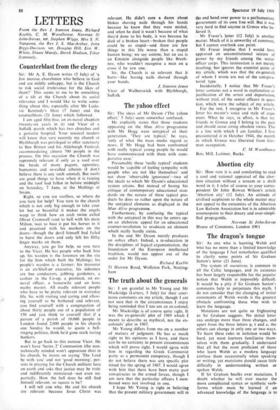The dragon's tongue
Sir: As one who is learning Welsh and who has no more than a limited knowledge of the language I feel nonetheless qualified to clarify some points of Sir Graham Sutton's letter (21 June).
The system of mutations is common to all the Celtic languages, and its existence has been largely responsible for the popular notion that Welsh is impossibly difficult. It would be a pity if Sir Graham Sutton's comments help to perpetuate this myth. I do not consider that the changing of initial consonants of Welsh words is the greatest obstacle confronting those who wish to learn the language.
Mutations are not quite so frightening as Sir Graham suggests. No initial letter can undergo more than three changes, and apart from the three letters p, t and c, the others can change in only one or two ways. To learn these rules in isolation would be hard, yet most learners familiarise them- selves with them gradually. I understand that all but the most proficient of those who learn Welsh as a modern language confuse them occasionally when speaking or writing, yet mutations should cause little difficulty in understanding written or spoken Welsh.
If Sir Graham baulks over mutations, I doubt whether he will ever master the more complicated syntax or synthetic verb- forms which must be learned if an advanced knowledge of the language is to be attained. Moreover, I should image that any attempt to abandon this funda- mental and distinctive feature of the Welsh language as he suggests would be firmly resisted. Incidentally, Sir Graham Sutton may not be aware that the first Welsh version of the New Testament, published in 1567, was never widely used because of the idiosyncrasies of the translator William Salesbury, of which the omission of muttt- tions from the text made it almost unread- able.



































 Previous page
Previous page